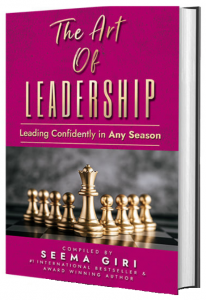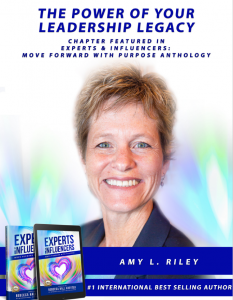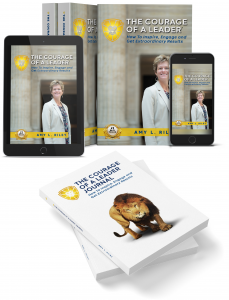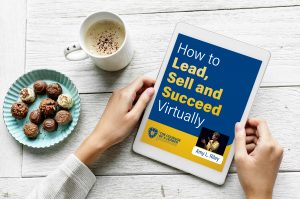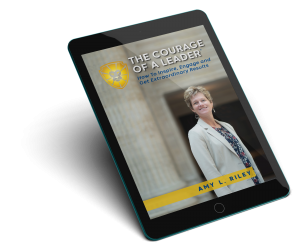Welcome to this episode entitled: Find Peace in Leadership Storms: Top Podcast Fan Shares Her Most Powerful Secrets From Our Previous Guests.
You’ll hear from Elisabeth Herbner, a dear friend, business owner and healthcare worker who helps people reach their goals in a variety of ways.
I’m glad you’re here because you’re going to get the cliff notes from 3 previous episodes of The Courage of a Leader podcast, which provide important Ah Ha!s, and learn how you can create your own Ah Ha!s every day.
About the Guest:
Elisabeth Herbner has been helping people reach their goals since studying health and wellness in college. She owns a small business teaching yoga where she is fulfilling her purpose of bringing peace, light and love into the world. Elisabeth has worked with a wide variety of clients from professional athletes to librarians. In 2014, she actively chose to step down from people leadership and full time fitness to start working in health care. Over her multiple careers, she has found her favorite role is support and cheerleader, which she learned from her biggest fan, her mom.
About the Host:
Amy L. Riley is an internationally renowned speaker, author and consultant. She has over 2 decades of experience developing leaders at all levels. Her clients include Cisco Systems, Deloitte and Barclays.
As a trusted leadership coach and consultant, Amy has worked with hundreds of leaders one-on-one, and thousands more as part of a group, to fully step into their leadership, create amazing teams and achieve extraordinary results.
Amy’s most popular keynote speeches are:
The Courage of a Leader: The Power of a Leadership Legacy
The Courage of a Leader: Create a Competitive Advantage with Sustainable, Results-Producing Cross-System Collaboration
The Courage of a Leader: Accelerate Trust with Your Team, Customers and Community
The Courage of a Leader: How to Build a Happy and Successful Hybrid Team
Her new book is a #1 international best-seller and is entitled, The Courage of a Leader: How to Inspire, Engage and Get Extraordinary Results.
https://www.linkedin.com/in/amyshoopriley/
Link mentioned in the podcast
How to Use What We Know About Neuroscience to Be Exponentially More Influential (podcast episode): https://www.courageofaleader.com/captivate-podcast/how-to-use-what-we-know-about-neuroscience-to-be-exponentially-more-influential-with-laura-berger/
The Courage to Be An Inclusive Leader (podcast episode): https://www.courageofaleader.com/captivate-podcast/the-courage-to-be-an-inclusive-leader-with-ellen-burton/
Innovative Ways You Can Create a More Sustainable World (podcast episode): https://www.courageofaleader.com/captivate-podcast/innovative-ways-you-can-create-a-more-sustainable-world-with-simon-bailey/
The Inspire Your Team assessment (the courage assessment): https://www.courageofaleader.com/inspireyourteam/
Thanks for listening!
Thanks so much for listening to The Courage of a Leader podcast! If you got inspired and/or got valuable leadership techniques you can use from this episode and think that others could benefit from listening, please share using the social media buttons on this page.
Do you have questions or feedback about this episode? Leave a comment in the section below!
Subscribe to the podcast
If you would like to get automatic updates of new The Courage of a Leader podcast episodes, you can subscribe to the podcast on Apple Podcasts. You can also subscribe in your favorite podcast app.
Leave us an Apple Podcasts review
Ratings and reviews from our listeners are extremely valuable to us and greatly appreciated. They help our podcast rank higher on Apple Podcasts, which helps us ignite The Courage of a Leader in more leaders! Please take a minute and leave an honest review on Apple Podcasts.
Teaser for next episode
Tune in next for Top 10 Ways to Find Real Wisdom as a Leader with Elisabeth Herbner. Yes, she’s back! This time sharing more from her own wisdom, rather than what inspired her from previous The Courage of a Leader episodes.
Transcript
Welcome to this episode entitled find peace and leadership storms. Top podcast fan shares her most powerful secrets from our previous guests. You'll hear from Elizabeth Hubner, a dear friend, business owner and healthcare worker who helps people reach their goals in a variety of ways. I'm glad you're here, because you're gonna get the Cliff Notes from three previous episodes of the courage of a leader podcast, which provide important AHA cars, and learn how you can create your own AHA lives every day.
Amy Riley:Welcome to the Courage of a Leader podcast. This is where you hear real life stories of top leaders achieving extraordinary results. And you get practical advice and techniques, you can immediately apply for your own success. This is where you will get inspired. And take bold, courageous action. I am so glad you can join us. I'm your host, Amy Riley. Now, are you ready to step into the full power of your leadership and achieved the results you care about most? Let's ignite the courage of a leader.
Amy Riley:I am delighted to be here today with Elisabeth, who I'm super honored is a regular consistent listener of the Courage of a Leader podcast that absolutely delights me. So I think of Elisabeth as number one listener. And Elisabeth, you know, that's something I've admired about you for a long time. I think it's super inspiring. And an amazing life skill is that you are able to tune into yourself to see what you need, and tune out to the world and find the resources that will best support you help you get where you're going support you in a moment. And I know that you're using the Courage of a Leader podcast as a resource in your life right now. And I thought I'd start with the question, what episodes what guests? What leadership techniques have we shared, that have made a difference for you that you've attracted into your life in the right moment?
Elisabeth Herbner:Yes, it started working out over my lunch hour again, at work. And so I was just like, wow, what can I listen to? And I say, oh, let's listen to Amy's podcast. So I was super excited to be able to have that resource at my disposal. And also, I'm super honored to be a guest on your show. So thank you for having me. I'm so glad you're here. Because I used to work with Laura burger. Oh, yeah. So that was a super fun episode, I really loved the neuroscience and the science, because that's partially my background, as well, as is exercise physiology. And so I really kind of geek out with that when she was explaining all of the hormones and what goes on in your body and was really, that was a very inspiring podcast about creating that foundation of trust as a leader, because I've, as you know, myself have not had that foundation of trust with some of the leaders that I worked with. And I work hard to create that in my supportive leadership role that I currently have about work,
Amy Riley:how to help make the connection for the listeners? How did how did that connect from our exploration of how our brains work? Right, and how we can release chemicals in our brains and have the kinds of interactions with others that release chemicals in their brains? How did that tie to foundation of trust for you,
Elisabeth Herbner:knowing with my yoga background, how your sympathetic and parasympathetic nervous systems work, a lot of it was like the body language you use with people like I'm always mirroring people when I'm talking to them, or if they get defensive, I kind of back off and practice more compassion with them. And so that that physical connection of that space that you share in that energy that you have with people really brought it home for me to have people trust you in that moment, like creating that, that safe space, that ease with your body physically in your energy. Really, really hit home.
Amy Riley:Okay, nice, nice. I got it. Those things that we can do to build the trust with others in the moment and then I'm also hearing, trusting your knowledge and things that you innately practice when you're interacting with others. Yeah, nice.
Elisabeth Herbner:One of my favorite episodes was the inclusive leadership with Ellen Burton. That one, that one had me really like fist pumping, like, yes, like nodding and like, Ah, finally, like, that was just really neat, because the company that I work at is really working on inclusion, especially in leadership roles. So it's nice to know that it's being practiced and a much wider scope, and just so many interesting things like, you know, like, you're not responsible for that first initial response, you know, like, if somebody says something, you're like, Oh, that's a neat, that's like, your brain chemistry, what you are responsible for is, is your second thought about that thing. So that was really, as you know, I love to like, say, allowing and giving yourself permission, like, that felt like a huge relief, like, oh, like I can initially not feel great about something. And then I can flip the script in my mind, I have that control that's under my responsibility center, and I can move forward positively even if it's uncomfortable at first. Yes, all you're taking
Amy Riley:me back to that episode and the brilliance of Alan. I mean, is it she just talks about a topic that can make many feel uncomfortable, and has a tense, even if they have great intentions, they want to be an inclusive leader, but we can get so afraid of doing it wrong, and doing something that actually offend someone and excludes them when we had the opposite intention. But Ellen makes it so accessible. She talks about it in a light way, like, Hey, we're humans, and we're goofy, and we're gonna mess up. And we're not going to understand everybody else's filters and experience. And ah, I remember the relief of we are not responsible for our first thought. Yeah, it's ingrained bias. It's been socialized. We've all got it. See human nature, coming back to the brains, right there in our brains to protect us just anything that is unfamiliar. Our brain goes Danger, danger, danger. Yeah. Yeah.
Elisabeth Herbner::Amy Riley:nal athletes to librarians in:Elisabeth Herbner:Thanks for having me. Yummy.
Amy Riley:Yeah, so delighted. I know that we had talked about focusing on how to intentionally create space in our lives, and how to intentionally create space for what, what we want, what best supports, fulfills us, lights us up allows us to do our thing in this world. And I know you and I have talked about it a number of times. And since our pandemic, you know, like, we see this opportunity to intentionally choose what we put in what we might put back in. We see world and options in different ways now, and I know that sometimes I'm like, stop, stop, stop, people don't rush to fall back in. You're so great at this. Why is this important to you? How did how did you? How did you get here? How did you get to choice and intentionally creating space and creating what you want in your life,
Elisabeth Herbner:it's been a long journey. I, my yoga practice has just been my foundation for a very long time now. So I started, I think I took my first yoga class in high school and just have, you know, it's blossomed from there, and just all of the practices that I use, you know, I tell my yoga students that I am a recovering type a runner. And so my, my innate nature when I was little was to just go go go and get all the things done and do all the things and, and be part of everything and don't say no, and just jump in. And, and I thought that was like a natural thing. And I think most leaders can, you know, feel that similar drive in their lives. Yes. And yes, as I went further down the yoga path, I really started understanding how important it was to stay still, and listen, and quiet, not just your body, but your mind. So it kind of brought me into that safer space of slowing down and giving myself permission to slow down. And as my meditation practice grew with my yoga practice, and it started to hit home that that was super important. And so I know that like the word meditation, and mindfulness can feel overwhelming, like some of these other things that we've been talking about. And it's really super simple. I always tell people start with less than five minutes set or set yourself a timer. Meditation can be while you're brushing your teeth, or connect it to that habit of brushing your teeth. So like, encouraging that, but what I found from creating that space is that it gives you your mind the space to think new thoughts. And so I like to call those the aha moments. So if you're willing to share, and your first if you can remember your very first aha moment.
Amy Riley:Yeah, yes. So this is probably the memory that comes up when whenever folks ask me, What's your first vivid memory that you remember, is in kindergarten, we had an assignment Elizabeth to do a page of capital A's. And I took my pen and I made the mountain tops across the top of the cross the line without lifting up my pen. And then I put the cross of the A's across it. And I thought I was super clever. Like this was this was efficient. I this was a great way to get this assignment done. Right. And then turn that in. And I got called to the front of the classroom the next day, and was told that although clever, this was not the assignment. I did what it was that moment where I you know, I made up like now I'm going to be a rule follower. Now. I'm going to be a good girl. But it was also an AHA of oh, people see things different ways. Right? There's different perspectives here. brains work in different ways. That's powerful. Yeah, all that makes me think about an AHA with my son. He was about seven and he was learning to stop sucking his thumb. And then finally, the dentist said, you have to stop right? It's it's gonna cause issues with your teeth and your jaw and his face went white during that dental appointment. But as the dentist suggests, Did we put together a little reward program and Elizabeth, he actually was so sweet about the award program that he put together was like four days without sucking my thumb. Then I get a chocolate milk. And then like four more eggs, and then I get another chocolate mug. And then there was a toy. At the end of like 45 days. Well, one day he had been to school he'd been to after school, he'd been to a friend's house, and I was picking him up, and I was really showering him with praise. You were in these different environments. And everyone's reported that you've done great, and I'm so proud of you, and you're finding ways to like interrupt your pattern in a variety of situations. And he says, Mom, can you stop all of your cheerleading is just making the day seem longer?
Elisabeth Herbner:Well, kudos for, for asking what he means, right? So
Amy Riley:we needed and I was like, whoa, this kid is wired differently than I am. Right. Like, I'll take that positive reinforcement that praise all day long. And I'm like, mild differences. Huh? MMA style differences at play. Yeah, right. And, and the thing that sometimes just gets me and I work with leaders who I know have great intentions, but their actions are being counterintuitive, right? They're good. They're giving, giving, giving what others don't want or need in that moment. Because they operate differently. They would like something different. Right. So we have those conversations about what works for you. Yeah. What best support you what best supports you in this moment? Oh, I like your framing of these aha moments. Yeah.
Elisabeth Herbner:No. So my first vivid memory, yes. That I can remember. And I think it was probably around the same time as yours. I know. It was definitely grade school. Was that and I don't know if you experienced this, but I personally experienced deja vu. Yes, I do. Yes. So yeah, the fact that I put that together. And it was like, because at the time when it happened, I was like, What is going on? You know, like, I was like, totally freaked out. And then
Amy Riley:I remember having them as a young young child,
Elisabeth Herbner:I've always I've always had it and I just, I was totally for a minute, and then it hit me. And I was like, holy cow. This is incredible. And so I've always used that deja vu, presence in my life, as like you are going in the right direction. Like this is where this is your path, you're on the right path, like, and it's funny, because I've told people that like when I worked in Chicago for the training center, like I literally had it out on a training ride with my boss. And I told him that and he looked at me like I was from monitors. And he was like, You kidding me? You never had this like, oh my god like it. It's just, again, a different experience and different, you know, happenings for everyone and how we are and I
Amy Riley:love what you made it mean. You made it mean synchronicity on the right path, like heading in the in the right direction. Right like this was meant to be I already saw this.
Elisabeth Herbner:Yeah, yeah. Yeah. I've been here.
Amy Riley:Yeah. Oh, love it. Oh, that gives me goosebumps.
Elisabeth Herbner:And then, do you remember your most recent aha moment?
Amy Riley:What is my most recent aha moment?
Elisabeth Herbner:I can go first. And then maybe, yeah, I think I've had quite a few lately. My coworker was out on medical leave. And so I was doing two roles for a little bit. And one day, I was like folding towels. And I was doing it real fast. Because I thought I was in a hurry. And I realized, like, how you do anything is how you do everything. And so I just slowed down, and I peacefully folded the pillowcases and the towels, because I wasn't in a hurry. And he shared that with my yoga class. And I was like, oh, and then just Sunday, I was subbing yoga for me, my, the woman who owns the studio I work at, and she has this interesting person that comes to class, and she has these letters that light up in the front of the room that's felt peace. And I was talking about how my version of gentle yoga was very different than hers. And I take that, that gentle part very seriously. And so it was a different pace that we were practicing at and he was like, Yeah, you can get your piece at a different pace. He's just like, it was like, wow, like that's so cool. And then, just yesterday, as I was prepping, finalizing my notes for the pod, I had an aha moment about how to share creating the space with people. So I was just really, really happy about that.
Amy Riley:Oh, awesome. I love that you can create peace at your pace. Yeah. So this feels like a little thing. Two days ago. I wasn't getting to my run until late in the day. So it was happening at the gym. And you know, at the gym, I've got a quarter mile track. So it's pretty nice. And Monday evening, it was pretty busy, pretty busy on the track. But I was having a good run, I had some good, some good PEP, I was thinking through some things in my head, it just felt like a, a great space. And there starts to be two gentlemen who are walking side by side. And they're taking up the whole track. And there's like a, there's a running lane. And then there's a white line. And then there's the walking lane. Right. And I'm just thinking, like I've seen, I've seen other pairs of people walking on the track, you know, and they're careful to look for the runners and then like, scoot themselves over. These guys were oblivious, right. So every time I went by, and I did 10 miles, and they were walking for a good portion of it. Excuse me, excuse me, right? I felt myself starting to get like, really, gentlemen, like, this is a track I'm coming around like, and I just said you're having a great run. What are you doing? Like do do not let this take away from your from your great run you because I was getting into the like, I should stand up for myself. I shouldn't say something, I should add it out. You're having a great run, like what would have you continue to have a great run. I'm like, I don't want to say anything to them. Because I don't want to worry about whether how they took it or what happened or whatever. I'm just kidding. I'll just keep saying Excuse me. And I'll just put it out of the way. So just like, oh, like I have a choice here. Right, I'm starting to get wound up about what I should do and what they should do and what they should not be doing in this in this moment. Right. Which is, which is allowing me to you know, talk about it in in humor?
Elisabeth Herbner:Yeah, yes. And that's, that's the perfect example of like, retraining your brain and creating space for new thoughts. I like
Amy Riley:your distinction of naming them as aha moments, right? So that we recognize that we're having a having a choice that we're shifting our thinking in the moment. Because each time we do that, it alters our destination, and alters our destination for the run for the day for the project for the relationship, whatever it is. So to have like AHA mile markers, is really great. I'm taking that on.
Elisabeth Herbner:Yeah, it and it's so it seems so small, but it's those small things that and that's what I think about like this, the space aspect is that it seems so trivial. Like why? Why do I need to make five minutes of journal time in the morning before I go to my phone? You know, like, Why? Why are these things important? And it it's because you mentally, emotionally, spiritually need a little space. You need to detach and, and and then that stuff bubbles up. And you and I have had that conversation about like, Oh my God, it is so hard, always being the bigger person and that we just keep having people in our lives that that you know, help us grow further. Yes, so
Amy Riley:I want to come back to the power because you said these two things pretty quickly, but they're big things. Stay still. And listen. And gosh, I just was really impacted by how in our lives right now. And with these phones that we can access at any time. It's like never like, stay still. Yeah, right. I mean, I used to have to stay still when I waited in line for something, because I didn't have a phone to fiddle with. wasn't carrying around a book. So you know, like you. You stood still.
Elisabeth Herbner:Yeah. And that's it. So to two things that sparked from from your mention. So even though you were running, you weren't still, but you were doing a meditative practice. You were on that pace of running that felt comfortable, you were having a great run, you know, and so that I think a lot of people when they they hear meditation, I think I have to sit and stillness, not running can be a moving meditation and that space allowed you to give yourself grace and permission to be like, I'm having a great run. And you practice compassion with with two guys who you You don't maybe you don't know why they were walking like that you have no clue. And you and I have both suffered loss. And so it just, it sparks like, Oh, my dad goes to the why. And he walks with a buddy and like, yeah, people didn't know that his wife passed away. Like, they might get mad at him like you were getting frustrated with them. And so it's just this whole. I've just been so much more compassionate since experience in my loss. Mm hmm. And that brings me
Amy Riley:back to the podcast with Ellen to like, our initial reaction, but like check, check the initial reaction, right. I don't know what's going on with whatever. But yeah, love it. Lovely. Thank you so much, Elisabeth.
Elisabeth Herbner:Thanks for having me. This was super fun. My pleasure.

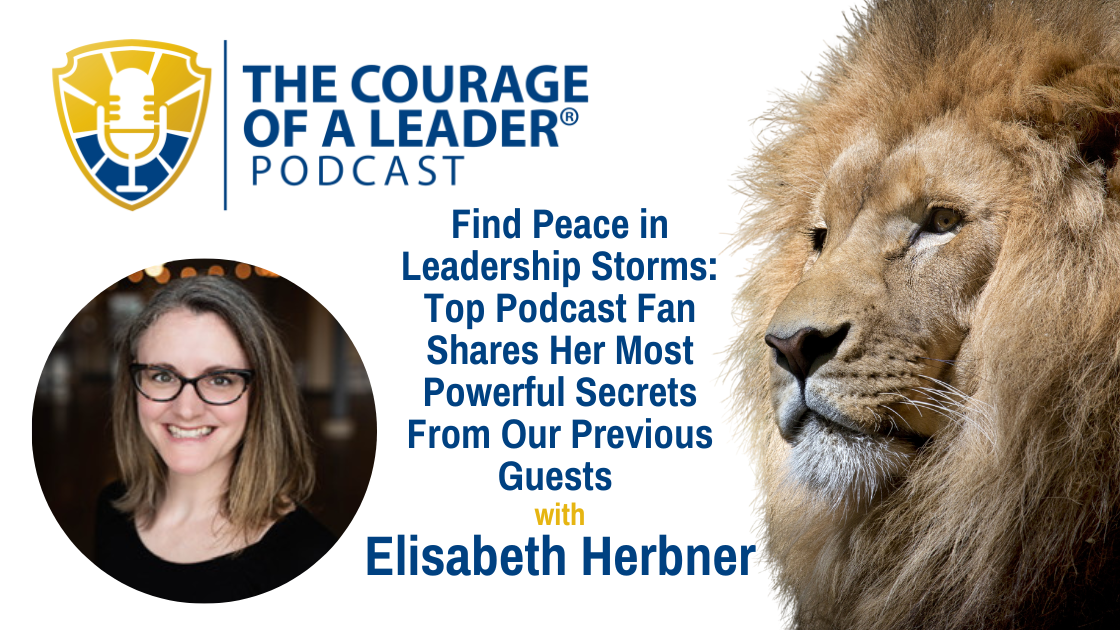
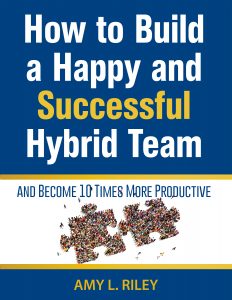
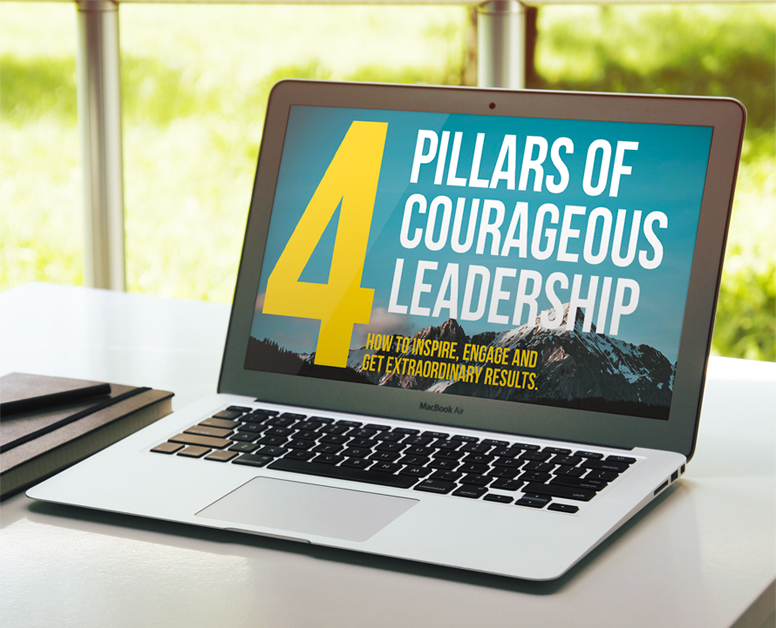 A Summary of The Courage of a Leader® 4 Pillars
A Summary of The Courage of a Leader® 4 Pillars